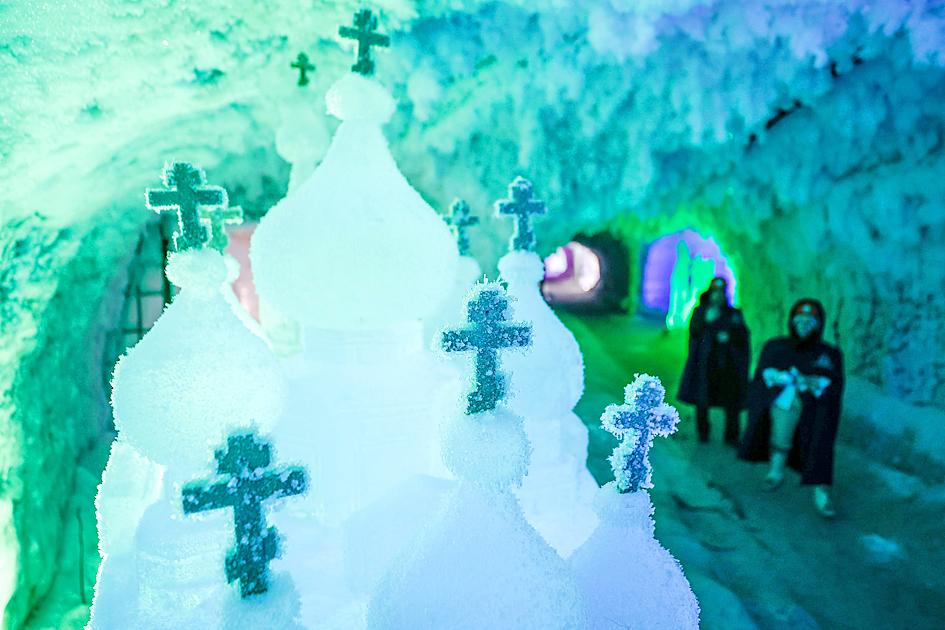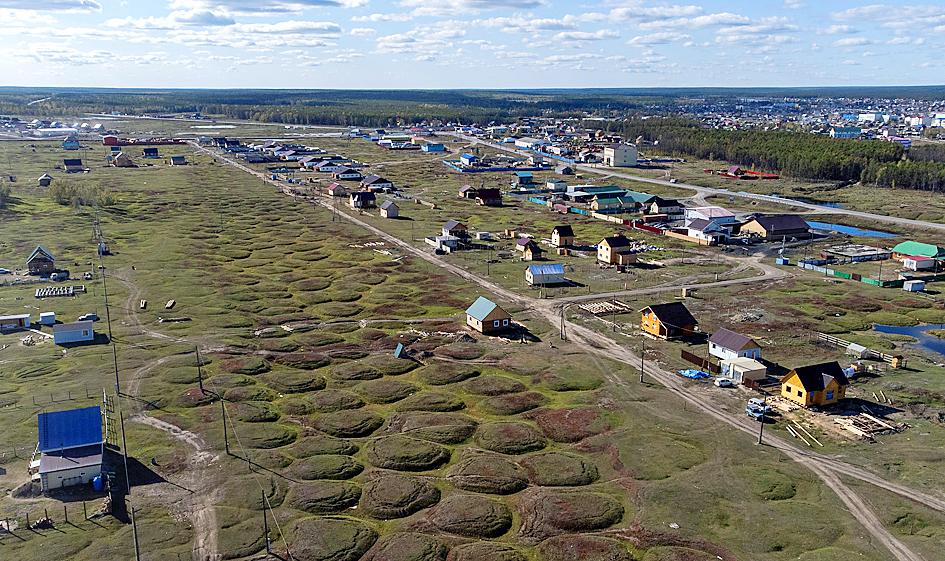The old airport in the Siberian settlement of Churapcha has been unusable for years, its runway transformed into a swampy field of puffed-up mounds and reliefs.
As with cities and towns across northern and northeastern Russia, Churapcha is experiencing the consequence of climate change thawing the permafrost on which everything is built.
“There isn’t a single settlement in Russia’s arctic where you wouldn’t find a destroyed or deformed building,” said Alexey Maslakov, a scientist at Moscow State University.

Photo: Reuters
Homes are becoming separated from sinking earth. Pipelines and storage facilities are under threat. Roads are increasingly in need of repair.
As Russia warms 2.8 times faster than the global average, the melting of Siberia’s long-frozen tundra is releasing greenhouse gases that scientists fear could frustrate global efforts to curb climate-warming emissions.
With permafrost covering 65 percent of Russia’s landmass, the costs are already mounting.

Photo: Reuters
Russia could face 7 trillion rubles (US$98.36 billion) in infrastructure damage by 2050 if the rate of warming continues, said Mikhail Zheleznyak, director of Yakutsk’s Melnikov Permafrost Institute.
The bumpy landscape around Churapcha, about 5,000km east of Moscow, resembles giant sheets of bubble wrap in places where ice wedges inside the ground have melted, causing the ground to crumble, sag or cave in altogether.
“Roads, electric power supply lines, gas pipelines, oil pipelines — all linear structures respond primarily to the warming climate and its impact on the permafrost,” said Alexander Fyodorov, deputy director of the Permafrost Institute.
Built in the 1960s and 1970s as Soviet Russia expanded into the arctic, many buildings in the far north and east were constructed with the assumption that the permafrost — frozen for millennia — was sturdy and would never thaw.
Apartment blocks sit atop stilts driven meters into the ground.
The airport in Churapcha, with a population of 10,000, was closed in the 1990s because of the melt, scientists say.
Over the years, the once-smooth runway has become a mottled field that looks more like a dragon’s back, as the ground sinks and the ice melts. Eventually, the area could become a lake, scientists say.
Fyodorov has been studying the site for years, and found that some areas were subsiding at an average rate of 2cm to 4cm per year, while others were sinking by up to 12cm annually.
In eight settlements in central Yakutia, a region in northeast Russia, 72 percent of people surveyed by the North-Eastern State University said they have had problems with the subsidence of their homes’ foundations, Fyodorov said.
Across Russia, there are more than 15 million people living on permafrost foundations. Russia is investing to better monitor the subterranean thaw.
“We don’t know what’s actually happening to it,” Russian Minister of Natural Resources and Ecology Alexander Kozlov said in August. “We need the monitoring not only to follow what is melting and how. Scientists will use it to predict its consequences and learn how to prevent accidents.”
The ministry plans to deploy 140 monitoring stations, each with up to 30m wells to measure the situation underground. While that might help determine how quickly the region is thawing, it would not help villagers such as Yegor Dyachkovsky whose home is already buckling at Churapcha’s former airport.
In the five years since his family built their home, the ground has sunk below it. At first the home was raised 30cm off the ground on its stilt foundations. The gap is now a full meter.
Dyachkovsky has brought five truckloads of soil to fill the gap between the ground and his home, and says he still needs more.
Some of his neighbors are trying to sell their homes.
“Everyone is trying to figure out the situation on their own,” said Sergei Atlasov, another Churapcha resident.
Dyachkovsky’s family is actually building a garage and seems ready to take his chances.
“How can we go against nature? We have to adapt,” Dyachkovsky said. “It’s like this everywhere. There’s no one to complain to — to the spirit up high, perhaps.”

A colossal explosion in the sky, unleashing energy hundreds of times greater than the Hiroshima bomb. A blinding flash nearly as bright as the sun. Shockwaves powerful enough to flatten everything for miles. It might sound apocalyptic, but a newly detected asteroid nearly the size of a football field now has a greater than 1 percent chance of colliding with Earth in about eight years. Such an impact has the potential for city-level devastation, depending on where it strikes. Scientists are not panicking yet, but they are watching closely. “At this point, it’s: ‘Let’s pay a lot of attention, let’s

UNDAUNTED: Panama would not renew an agreement to participate in Beijing’s Belt and Road project, its president said, proposing technical-level talks with the US US Secretary of State Marco Rubio on Sunday threatened action against Panama without immediate changes to reduce Chinese influence on the canal, but the country’s leader insisted he was not afraid of a US invasion and offered talks. On his first trip overseas as the top US diplomat, Rubio took a guided tour of the canal, accompanied by its Panamanian administrator as a South Korean-affiliated oil tanker and Marshall Islands-flagged cargo ship passed through the vital link between the Atlantic and Pacific oceans. However, Rubio was said to have had a firmer message in private, telling Panama that US President Donald Trump

CHEER ON: Students were greeted by citizens who honked their car horns or offered them food and drinks, while taxi drivers said they would give marchers a lift home Hundreds of students protesting graft they blame for 15 deaths in a building collapse on Friday marched through Serbia to the northern city of Novi Sad, where they plan to block three Danube River bridges this weekend. They received a hero’s welcome from fellow students and thousands of local residents in Novi Said after arriving on foot in their two-day, 80km journey from Belgrade. A small red carpet was placed on one of the bridges across the Danube that the students crossed as they entered the city. The bridge blockade planned for yesterday is to mark three months since a huge concrete construction

DIVERSIFY: While Japan already has plentiful access to LNG, a pipeline from Alaska would help it move away from riskier sources such as Russia and the Middle East Japan is considering offering support for a US$44 billion gas pipeline in Alaska as it seeks to court US President Donald Trump and forestall potential trade friction, three officials familiar with the matter said. Officials in Tokyo said Trump might raise the project, which he has said is key for US prosperity and security, when he meets Japanese Prime Minister Shigeru Ishiba for the first time in Washington as soon as next week, the sources said. Japan has doubts about the viability of the proposed 1,287km pipeline — intended to link fields in Alaska’s north to a port in the south, where